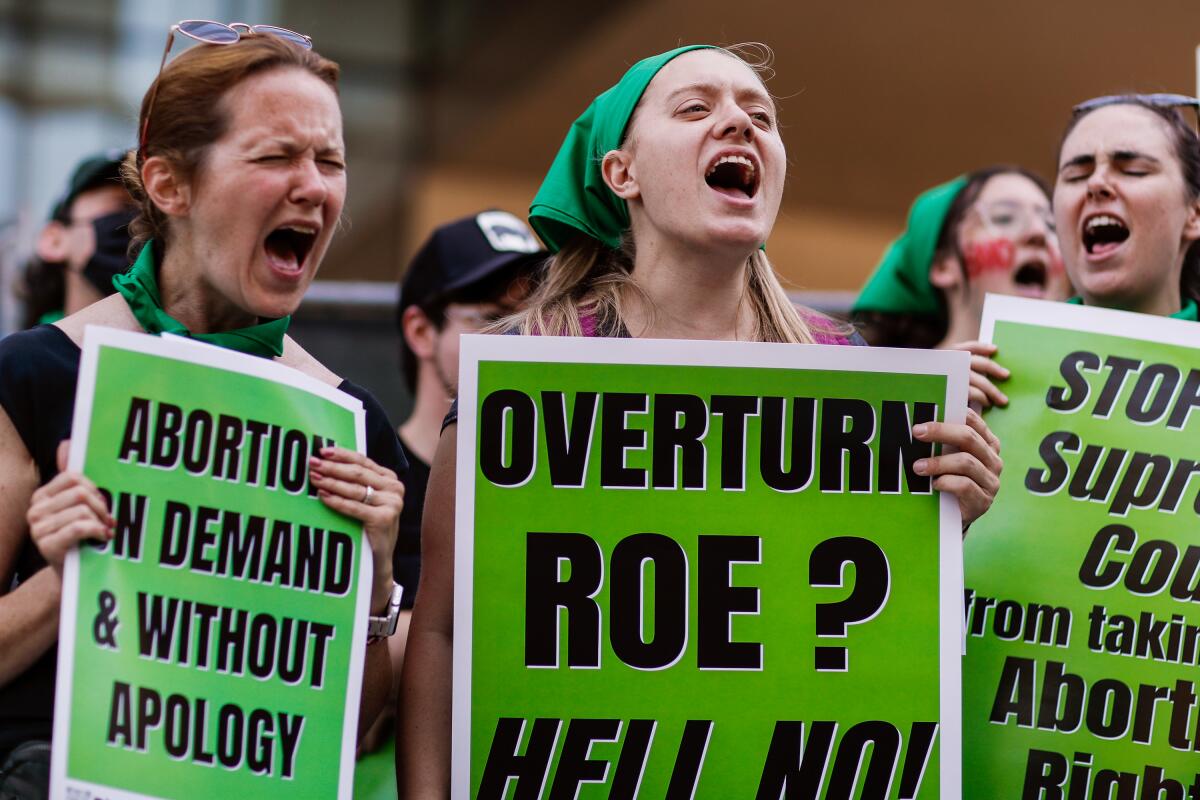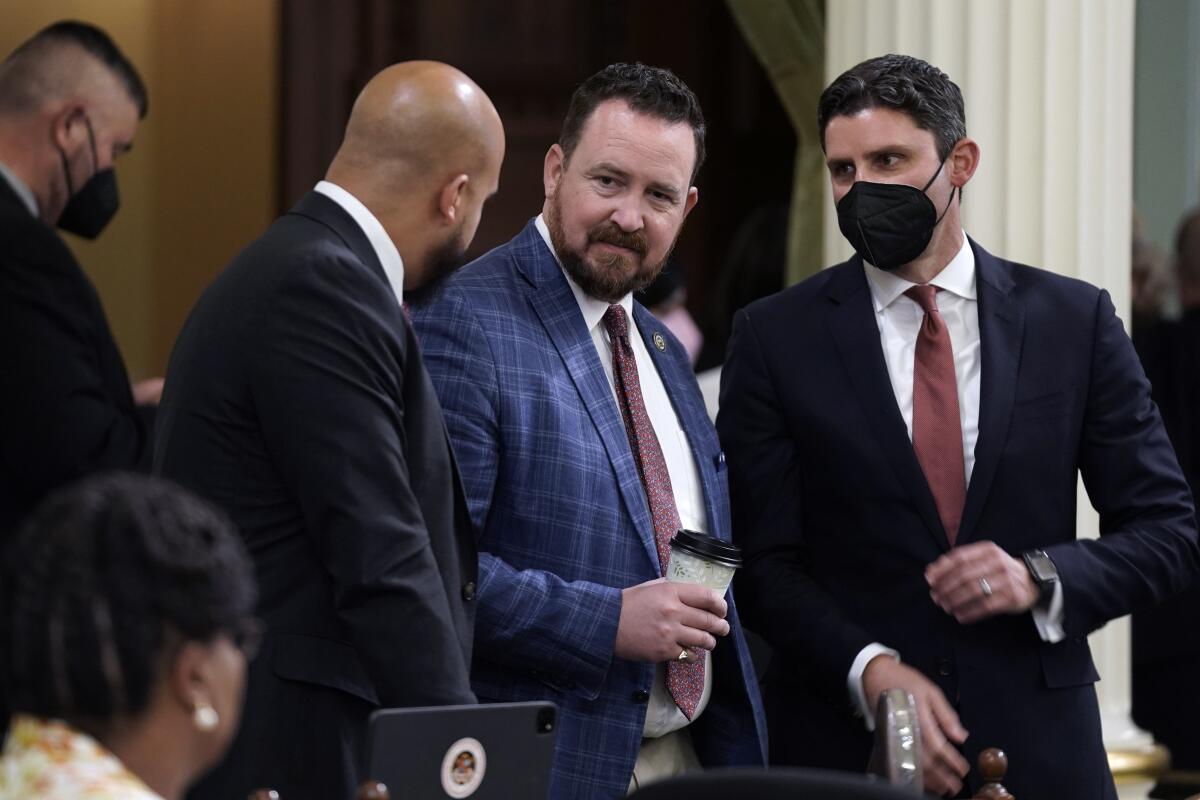California Politics: The state enters the new fiscal year with a fistful of dollars

- Share via
Welcome to the new fiscal year. With a budget signed, California enters with a cup that runneth over by more than $100 billion.
I’m Melody Gutierrez and I’m a reporter covering state government and politics. In today’s newsletter, we’re exploring California’s spending plan, the debate over abortion rights, a controversial Kaiser Permanente deal and the state’s search for its next auditor.
That anticipated surplus will be used, in part, to offer direct relief to Californians who have watched as their paychecks cover less and less amid high inflation. The new $307.9-billion state budget signed by Gov. Gavin Newsom on Thursday will provide gas refunds to most residents, which will range from $200 for individuals to $1,050 for couples with children.
The state will further eliminate immigration status as a prerequisite for Medi-Cal coverage, although the final age group of low-income immigrants 26 to 49 years old will not be covered until 2024. California will become the first state to offer food benefits to older immigrants residing in the U.S. illegally. There’s $1.4 billion in utility payment assistance, $250 million for paid sick leave and $75 million in drought relief grants.
California will pay down debt, including $1 billion paid over two years toward a $17.8-billion federal loan that the state used to fill a hole left by a surge in unemployment claims during the worst of the pandemic.
My newly anointed budget guru colleague Taryn Luna has all of the details, including why Newsom insisted on one-time expenditures amid economic uncertainty.
One week after the U.S. Supreme Court’s life-altering decision to overturn Roe vs. Wade, California’s budget includes more than $200 million for reproductive care — money that will help push California further out front of the renewed abortion rights movement.
The budget includes $40 million to pay for abortion services for low-income people, $20 million for scholarships and loan forgiveness to encourage students studying healthcare to commit to providing abortion care and $20 million for the California Abortion Support Fund, which would help pay for travel, child care and other costs a patient could incur to get to a clinic.
‘I refuse to be tokenized’

Assemblymember Isaac Bryan (D-Los Angeles) lifted his microphone on the Assembly floor on Monday, signaling he wanted to join the lengthy debate over abortion rights in California. Lawmakers stood one after another to share their personal stories about abortion as they prepared to vote on Senate Constitutional Amendment 10, which would allow voters in November to decide whether the state Constitution should explicitly protect a person’s right to an abortion and birth control.
Bryan, a newcomer to the Legislature after winning a special election last year, said his life story has had some question how he can support abortion rights. His mother was 16 when she was raped in Texas.
“She chose to give birth to me and gave me up for adoption,” Bryan said. “I get asked all the time why that doesn’t make me pro-life.”
Bryan said the answer, for him, is simple: His biological mother had options.
“She had choices. And they were hers to make,” said Bryan, 30. “And I refuse to be tokenized to undermine the bodily autonomy of women and childbearing people.”
Bryan said his biological mother, with whom he reconnected when he was in his late teens, is among those who point to his life as an argument for antiabortion policies.
“We don’t see this issue the same way,” he said.
If approved by voters, SCA 10 would further codify the state’s already progressive reproductive rights, granting anyone of reproductive age “the fundamental right to choose to bear a child or to choose and to obtain an abortion.” Currently, those rights in California are upheld by case law and statutory laws, but supporters said relentless attacks on abortion rights have proved that stronger protections are needed.
Kaiser deal officially inked
Amid the flurry of budget bills passed by the state Legislature was a controversial agreement to allow Kaiser Permanente to enter into a direct contract with the state to serve California’s Medi-Cal enrollees. The deal, which was negotiated behind closed doors between Kaiser and the Newsom administration, was first made public in February, prompting critics to argue that the state was giving preferential treatment to a generous supporter of the governor. Newsom signed the deal into law Thursday.
Kaiser will begin contracting directly with the state in 2024, bypassing local health plans, which will lose hundreds of thousands of enrollees and millions of dollars. Critics have argued that the “sweetheart deal” allows Kaiser special provisions not granted to other health plans, including the ability to limit which Medi-Cal enrollees can choose its plan. Kaiser generally does not accept new Medi-Cal enrollees unless the person has a recent history with the insurer or a family member with coverage.
“This legislation is broad in nature, so we look forward to working with the state to ensure transparency on where and how Kaiser will operate, and that stakeholders have input on community impact,” said Linnea Koopmans, chief executive of Local Health Plans of California, which represents 16 local health plans that serve more than 70% of Californians enrolled in Medi-Cal managed care.
The state said the no-bid contract was needed because of the unique nature of Kaiser, which is both an insurer and a healthcare provider. Under the deal, Kaiser will expand coverage to youth in foster care and those eligible for Medicare. The Newsom administration initially sought to put the deal’s provisions into a budget bill that would forgo typical policy hearings.
“We said, ‘Au contraire,’” said state Sen. Susan Talamantes Eggman (D-Stockton). “We said we’re not doing that.”
The deal was contained in Assembly Bill 2724, which Eggman said allowed lawmakers to create additional oversight.
“We’ve put the guardrails on and we’ve taken amendments, and we’ve changed the structure to make sure that Californians are getting the very best healthcare and the access that they need,” she said.
California’s next auditor still TBD
The search for California’s next state auditor is still underway seven months after Elaine Howle ended her 21-year run as the longest-serving auditor in state history.
In all, 18 candidates applied to be state auditor, although two withdrew, according to committee staff. A bipartisan panel of legislative staff interviewed 11 of the candidates earlier this year. A subcommittee of the Joint Legislative Audit Committee interviewed candidates but still needs to meet to discuss them when lawmakers return from summer recess in August.
The names of candidates are confidential until the committee holds a public hearing to select the three candidates who will be forwarded to Newsom, who will appoint one in charge of an agency that will be scrutinizing his administration.
While lawmakers narrow the pool of candidates, the office continues to turn out blistering reports under acting state Auditor Michael Tilden. Last week, a state audit found Bellflower Unified School District provided inaccurate financial information to its school board and failed to support students, particularly during the pandemic, despite ample cash on hand.
Enjoying this newsletter? Consider subscribing to the Los Angeles Times
Your support helps us deliver the news that matters most. Become a subscriber.
California politics lightning round
— California will no longer contract with the AIDS Healthcare Foundation to provide healthcare plans for hundreds of HIV-positive patients in Los Angeles County after the state accused the high-profile nonprofit of engaging in improper tactics during negotiations over rates. The foundation’s controversial founder, Michael Weinstein, called the state’s move “pure retaliation.”
— A controversial plan from Newsom would potentially help extend the life of beachfront gas plants and the Diablo Canyon nuclear plant, making it easier for solar and wind farm developers to sidestep local government opposition and limiting environmental reviews for all kinds of energy projects.
— On Thursday, Newsom signed into law the nation’s most far-reaching restrictions on single-use plastics and packaging. The legislation heads off a November ballot measure that many lawmakers and the plastics industry hoped to avoid.
— For the third time, California lawmakers are considering a bill by Assemblymember Cristina Garcia (D-Bell Gardens) to allow human composting, an eco-friendly alternative burial option. When composted, a body is placed in a steel vessel and buried in wood chips and other biodegradable materials that allow the body to naturally decompose over a 30-day period. Assembly Bill 351 would make California the fifth state to legalize human composting.
— The California Department of Justice said Wednesday that a massive leak of personal information from a California state database for permits to carry concealed weapons is larger than initially reported. The leak affected not only current permit holders but anybody who was granted or denied a permit to carry a concealed weapon from 2011 to 2021.
— California voters in November will consider a constitutional amendment enshrining abortion rights. So what would it do?
— State lawmakers gave the city of Los Angeles and other cities in Southern California a reprieve on a deadline to rezone their communities to accommodate more home building.
— California education and legal experts say the U.S. Supreme Court’s decision to permit a high school football coach to pray on the field after games is expected to reopen a debate over how far religion can enter public school grounds.
Stay in touch
Did someone forward you this? Sign up here to get California Politics in your inbox.
Until next time, send your comments, suggestions and news tips to capolitics@latimes.com.
Sign up for Essential California
The most important California stories and recommendations in your inbox every morning.
You may occasionally receive promotional content from the Los Angeles Times.







